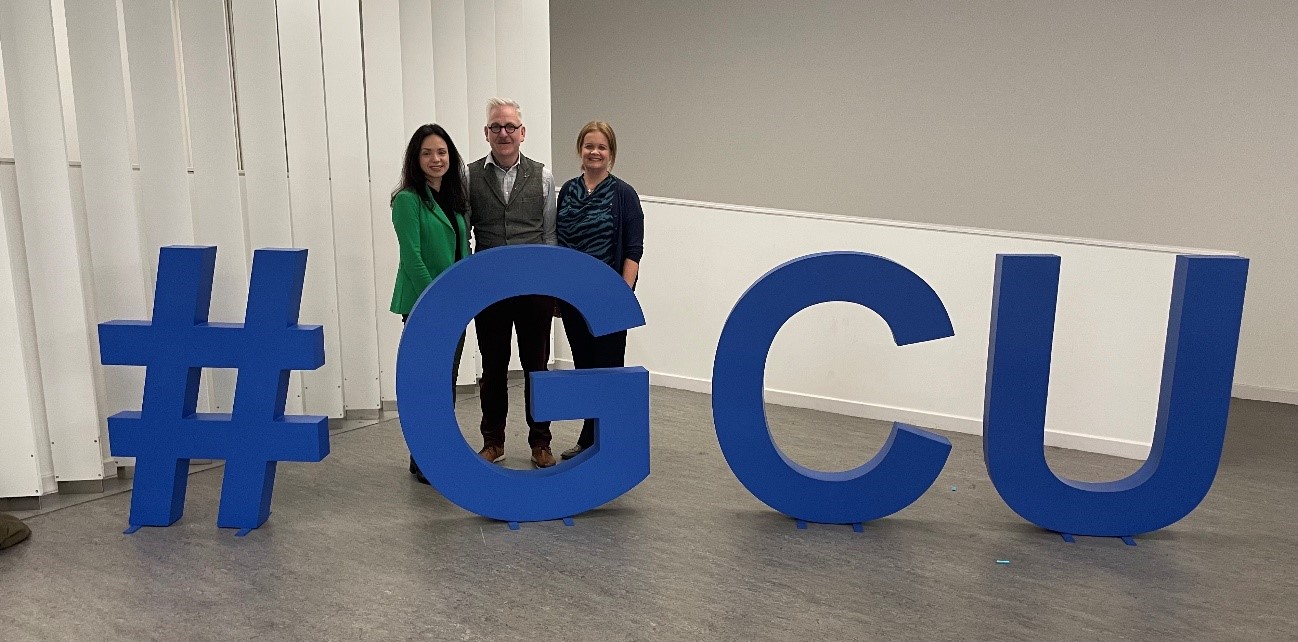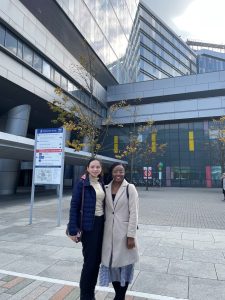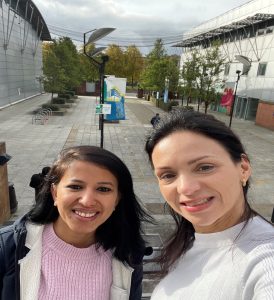By Professor Caroline Lopes Ciofi Silva

From October 10th to October 15th I visited the Safeguarding Health through Infection Prevention (SHIP) Research group at Glasgow Caledonian University. My trip was funded by the Global Research Nurses, a network focusing on supporting nurses who conduct research around the world. As part of their activities, they launched the Global Research Nurses Pump Priming Awards 2021 and selected nurses and midwives in low and middle-income countries to fund the workshop, research travel and research projects. The main goal of my visit was to strengthen the partnership and network between SHIP and the Universities of Sao Paulo & Campinas; building synergy to improve research skills and facilitate the development of future collaborative projects.
After postponing my visit due to the pandemic in the beginning of 2022, I had the opportunity to travel and gain a better understanding of the activities performed by the SHIP team, as well as a greater insight into the role of Scottish nurses in Antimicrobial Stewardship (AMS). This is important because in Brazil, there is a lack of awareness concerning the importance of nurses’ role in AMS and the Brazilian research team intend to address this issue through implementation research.

I hoped to understand more about how nurses’ work with AMS in Scotland so Dr Valerie Ness organised for Ph. D. student Ayodeji Matuluko to accompany me on a visit to the Queen Elizabeth University Hospital, where we joined Dr. Andrew Seaton (Consultant in Infectious Diseases and General Medicine and Chair of the Scottish Antimicrobial Prescribing Group – SAPG) on an antimicrobial ward round. We were also introduced to the Outpatient Parenteral Antibiotic Therapy (OPAT) service. It was fascinating to notice how much autonomy the nurses in this service had, how they work collaboratively with the inter-professional team, as well as understanding the attributions of nurse prescribers and what the requirements are to become one in Scotland.

Ph.D. student Deepti KC took me on a tour of the Glasgow Caledonian University campus. One thing I thought was remarkable was the presence of students from many different nationalities. This was followed by a meeting with members of the SHIP team where I was able to introduce myself and share with them the ongoing research projects being conducted by myself and my Brazilian colleagues. I also attended a SHIP team meeting to learn more about their ongoing activities. The organization and objectivity of this meeting stood out to me, with timely and helpful support provided by the staff from the Research Centre for Health (ReaCH). It is also worth noting how the professors and postgraduate students in the group support and motivate each other. I believe this was one of the most fundamental takeaways for me on this visit. In short, concise and problem-solving discussions, emphasizing the importance of teamwork, can certainly optimize results.
Later on, I met Professor Jacqui Reilly to discuss how she has been involved at a national level in developing and managing infection prevention and control over the years and continues to do so as part of her role in National Services Scotland (NSS). I learnt about the nationally held database on nurses’ prescribing, national surveillance system for healthcare associated infection, and efforts to improve cleaning practices in healthcare facilities in Scotland. It was inspiring to hear about her professional trajectory and realize the many breakthroughs she has achieved as a nurse.
During my time at GCU, I also had the opportunity to attend two undergraduate classes: one of them on research methods and planning a research project, and the other about public health policies in Scotland. It was riveting to observe the educational strategies used by the lecturers aiming to foster the development of critical thinking among the students.
In between these activities we also discussed future research projects that could flourish from the partnership between the Brazilian Universities and Glasgow Caledonian University. In the first instance, we intend to share our experiences by publishing a paper on how the experiences of Scottish nurses in AMS can contribute to the fight against antimicrobial resistance in Brazil.
It was amazing to see how everyone went out of their way to make me feel at ease and were always available to answer my every question. I am confident that the invaluable opportunity in observing and Scottish nurses’ working in AMS, in understanding the enablers and challenges they encounter, and in talking face-to-face with the stakeholders in Scotland, will motivate me to continue working to expand AMS in Brazilian nursing. I am forever grateful for the amazing reception of Dr Valerie Ness and all of the SHIP research group.
Further information
SHIP research group
https://www.gcu.ac.uk/aboutgcu/academicschools/hls/research/researchgroups/safeguardinghealththroughinfectionprevention
Glasgow Caledonian University
https://www.gcu.ac.uk/
Global Pump Priming awards 2021
https://globalresearchnurses.tghn.org/opportunities/pump-priming-awards-2021/
University of Sao Paulo
https://www5.usp.br/
University of Campinas
http://www.fenf.unicamp.br/en
ReaCH
https://www.gcu.ac.uk/research/researchcentres/reach